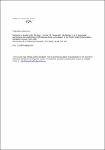Molecular genotyping and epidemiology of measles virus transmission in the World Health Organization European Region, 2007-2009
Mankertz, Annette
Mulders, Mick N.
Shulga, Sergey
Kremer, Jacques R.
Brown, Kevin E.
Santibanez, Sabine
Muller, Claude P.
Tikhonova, Nina
Lipskaya, Galina
Jankovic, Dragan
Khetsuriani, Nino
Martin, Rebecca
Gavrilin, Eugene
Background: In 2002, the World Health Organization (WHO) adopted a goal to eliminate measles in the European Region by 2010. Measles elimination is defined as the interruption of indigenous measles virus (MV) transmission. The molecular epidemiology of MV transmission in the WHO European Region was studied through the investigation of reported cases and outbreaks to monitor the region's progress toward its measles elimination goal. Methods: National and regional laboratories performed molecular characterization of MV detected between 2007 and 2009 in the WHO European Region. To document indigenous transmission and importations into the region, we analyzed genotyping results and epidemiological data on measles outbreaks reported by the member states. Results: Since 2007, MV genotype D6 has not been reported in the WHO European Region, suggesting that its chains of transmission have been interrupted, whereas several other MV genotypes are still circulating. Although several European countries have already interrupted indigenous MV transmission, genotyping showed that 3 endemic MV transmission chains have been reestablished in other countries. Conclusions: The WHO European Region 2010 goal will not be met, as indigenous transmission of MV has not been interrupted. As the region begins to document its process of elimination verification to monitor progress toward the goal, countries will need to ensure that genotyping is performed in all measles outbreaks.
Dateien zu dieser Publikation
Keine Lizenzangabe
Verwandte Publikationen
Anzeige der Publikationen mit ähnlichem Titel, Autor, Urheber und Thema.
-
2014-09-04ZeitschriftenartikelMeasles virus spread initiated at international mass gatherings in Europe, 2011 Santibanez, Sabine; Prosenc, K.; Lohr, D.; Pfaff, Günter; Markocic, O. Jordan; Mankertz, AnnetteThree parallel transmission chains of measles virus (MV) variant ‘D8-Villupuram’ (D8-V) originated from two coinciding international mass gathering (MG) events in Rimini, Italy, in June 2011. MV D8-V was independently ...
-
2011-08-01ZeitschriftenartikelSpread of Measles Virus D4-Hamburg, Europe, 2008–2011 Mankertz, Annette; Mihneva, Zefira; Gold, Hermann; Baumgarte, Sigrid; Baillot, Armin; Helble, Rudolph; Roggendorf, Hedwig; Bosevska, Golubinka; Nedeljkovic, Jasminka; Makowka, Agata; Hutse, Veronik; Holzmann, Heidemarie; Aberle, Stefan W.; Cordey, Samuel; Necula, Gheorghe; Mentis, Andreas; Korukluoğlu, Gulay; Carr, Michael; Brown, Kevin E.; Hübschen, Judith M.; Muller, Claude P.; Mulders, Mick N.; Santibanez, SabineA new strain of measles virus, D4-Hamburg, was imported from London to Hamburg in December 2008 and subsequently spread to Bulgaria, where an outbreak of >24,300 cases was observed. We analyzed spread of the virus to ...
-
2009-07-22ZeitschriftenartikelMeasles viruses of genotype H1 evade recognition by vaccine-induced neutralizing antibodies targeting the linear haemagglutinin noose epitope Finsterbusch, Tim; Wolbert, Anne; Deitemeier, Ingrid; Meyer, Kerstin; Mosquera, Maria Mar; Mankertz, Annette; Santibanez, SabineThe linear haemagglutinin noose epitope (HNE; aa 379-410) is a protective B-cell epitope and considered to be highly conserved in both the vaccine and the wild-type measles virus (MeV) haemagglutinin (H) proteins. Vaccine ...

